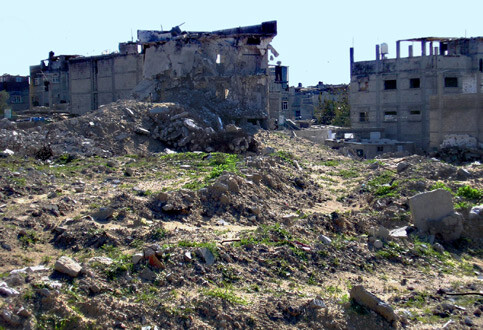Palestinian Center for Human Rights 17 August 2005

For Palestinians, Neve Dekalim, the largest Jewish settlement in the Gaza Strip, conjures up images of cold-blood killings and destruction as it used to be a launch pad for deadly Israeli raids into the adjacent city of Khan Yunis. (Arjan El Fassed)
Location: Southern Gaza Strip: al Mawasi, a sealed Palestinian enclave inside the “Gush Katif” settlement bloc. Palestinian areas near “Kfar Darom” settlement, southeast of Deir al-Balah.
Chronology of Events
The Israeli military has begun to move Israeli settlers from their illegal settlements inside the Gaza Strip. At the same time settlers have attacked Palestinian civilians while the Israeli Occupying Forces (IOF) continue to arbitrarily arrest and detain Palestinian civilians.
Inside many of the sealed areas of the Gaza Strip conditions remain extraordinarily difficult. Despite stockpiling of food and supplies by international organizations many Palestinian civilians remain under seige and medical crews have been unable to gain access.
The reports below represent a few of the many incidents recorded by PCHR’s fieldworkers since the ‘disengagement’ process began, showing some of the suffering and hardships imposed on Palestinian civilians during this time.
Closures and Curfews
Al-Mawasi
At approximately 06:00 on Wednesday, 17 August 2005, about 20 Israeli settlers raided al-Astal quarter in al-Mawasi area in Khan Yunis. They provocatively moved around houses. IOF intervened and evacuated them from the area.
In the meantime, IOF have continued to impose a tightened siege on al-Mawasi area. Settlers have been also present near the main roads and have obstructed the movement of vehicles. For instance, Palestinian ambulances have not been able to move between the two parts of al-Mawasi area in Khan Yunis and Rafah. Paramedics have been forced to move on foot to avoid obstacles placed by the settlers.
Palestinian medical crews have faced extreme difficulties in the evacuation of patients from al-Mawasi area to hospitals in other areas in the Gaza Strip due to the continued closure of al-Tuffah checkpoint at the entrance of the area. Coordination with the Israeli liaison is a precondition to allow the evacuation of patients from the area, and it usually takes a relatively long time. The following are a number of cases of patients whose evacuation to hospitals in the Gaza Strip was obstructed by IOF:
1. An application for coordination was submitted on 8 August 2005 to evacuate ‘Aliya Sameer al- Bardawil, 16, who suffers from a nephritic failure. Her evacuation to a hospital in Khan Yunis was allowed on 10 August 2005.
2. An application for coordination was submitted on 8 August 2005 to evacuate Muhannad Bassam Shallouf, 1, who was had a fester in the ear. His evacuation to a hospital in Khan Yunis was allowed on 12 August 2005. 3. An application for coordination was submitted to at approximately 09:00 on 9 August 2005 to evacuate Suleiman Nayef Abu Madiya, 12, who was suffering from a fracture in the limbs. His evacuation to a hospital in Khan Yunis was allowed at approximately 17:00 on the same day. 4. An application for coordination was submitted on 9 August 2005 to evacuate Mousa Ibrahim Zo’rob, 35. His evacuation to a hospital in Khan Yunis was allowed on 14 August 2005.
It is worth noting that only one physician works in the clinic of the area, which is unable to treat serious cases.
Attacks and Arrests
Kfar Darom
At approximately 19:10 on Tuesday, 16 August 2005, IOF moved nearly 70 meters into Palestinian areas located to the west of “Kfar Darom” settlement, southeast of Deir al-Balah. They raided and searched a house belonging to Khalil Mohammed al-Tawashi, 55. They held the 25 residents of the house (4 families) in one room on the first floor and transformed the second and third floors into a military site. IOF have been so far positioned atop of the house.
Beit Lahia
At approximately 02:00 on Tuesday, 16 August 2005, IOF moved from “Dogit” settlement nearly 400 meters into Palestinian areas located to the south. They surrounded a 180-square-meter, 2-storey house belonging to Riad Mustafa Zindah, in which 11 individuals live; and a 150-square-meter, 3-storey house belonging to Mustafa Riad Zindah, in which 4 individuals live. IOF bulldozers placed sand barriers near the two houses. At approximately 10:00, IOF forced residents of the two houses out and transformed the two houses into military sites to allegedly secure the implementation of the ‘disengagement Plan’ in the area. The two houses have been so far seized by IOF.
International Law
Settlements and settlers are illegal under international law. The Fourth Geneva Convention, the primary document governing the OPT, stipulates in Article 49 that the transfer of the population of the occupying power into the occupied territory is in breach of international law. The International Court of Justice confirmed in its 2004 judgment that settlements and settlement activity is illegal.
Freedom of movement is a right afforded to Palestinian civilians under the Fourth Geneva Convention as well as under established international treaties on human rights. Preventing free movement of people and goods interferes with the right to work, the right to health, the right to education, the right not to be held as a prisoner without a free and fair trial.
The Fourth Geneva Convention makes special provision for the provision of services by the International Committee of the Red Cross, affiliated societies and other essential humanitarian agencies. Human Rights Defenders are also recognized as having a right to defend the entire range of economic, social, cultural, social, political and civil rights in the “Declaration on Human Rights Defenders”. Israel’s continued policy of denying access to Human Rights Defenders continues to have a direct impact on the working conditions of the Defenders themselves and, significantly, on the living conditions of the Palestinian civilian population.
Related Links